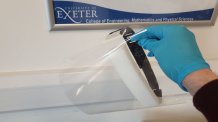
The shields, which protect the entire face of frontline health workers as they treat patients with COVID-19, have now been delivered to the hospital for immediate use.
University volunteers help build thousands of face shields for local NHS workers
Volunteers from the University of Exeter have teamed up with the local community to build thousands of disposable face shields, to help protect frontline NHS workers during the COVID-19 epidemic.
The team from the College of Engineering, Mathematics and Physical Sciences (EMPS) have assembled around 2,000 face shields for the local healthcare community, including the Royal Devon and Exeter Hospital.
The volunteers, who are PhD students, researchers and professional services staff, collaborated with a consortium of local businesses to make the face shields in a specially convened space on the University’s Streatham Campus. The project was co-ordinated by a volunteer group led by Rupa Chilvers, Director of Tangerine Bee, an Exeter-based small business working with health and care teams, in collaboration with the EMPS COVID response team.
The team spent two weeks creating the shields, working on a rota system to reduce the number of people on duty at any one time and ensure their safety. The shields, which protect the entire face of frontline health workers as they treat patients with COVID-19, have now been delivered to the hospital for immediate use.
Dr Ben Sherlock from the University of Exeter said: “I’m fortunate to collaborate with healthcare professionals in my research. This has allowed me to see the outstanding work they do on a daily basis. When it became apparent that there was a way we could support those on the frontline I, just like over a hundred other University of Exeter staff and students didn’t hesitate to volunteer to help.
Dr Lizzy James, Technical Services Business Partner for EMPS added: “Our volunteers have come together to produce these face shields and they have done an amazing job. We are very proud of what the team have achieved and hope their efforts will make a real difference in the local area”.
The vital face shields follow a simple design developed by the University of Bath, one of Exeter’s co-members of the GW4 alliance, who provided guidance to the team.
The design consists of a clear plastic visor that is attached to a foam section that rests against the forehead, and an elastic strip to hold in place around the back of the head.
The finished face shields are designed for one-off use. The costs of production were met by the local health and care teams in collaboration with Tangerine Bee.
Rupa Chilvers said: “We all worked together at pace to co-design, finalise the processes and turn around thousands of face shields. It is a testament to the individuals and their commitment that we were able to respond to local needs within a matter of days.”
Dave Tarbet, the Royal Devon & Exeter NHS Trust’s Business Development Director and Business Innovation Lead said: “We are grateful to the University of Exeter and all the local businesses involved in this tremendous piece of work. The production team worked alongside the Trust’s Clinical Innovation Lead, Dr Pete Ford, and infection control specialists to ensure that the PPE was made to a high quality and in line with the national requirements. On behalf of the Trust, I’d like to thank everyone involved for their support.”
The University of Exeter has been assisting the local community in the fight against COVID-19 in a variety of ways.
Previously, aacademics and technical staff united to send thousands of items of protective equipment normally used in laboratories to the NHS frontline and the local authority. Hundreds of boxes of gloves, along with face masks, visors and other personal protective equipment (PPE) have been sent to the Royal Cornwall Hospital Trust, Devon County Council and the Royal Devon and Exeter NHS Foundation Trust, to bolster their vital supplies.
Meanwhile, more than 50 final year Medicine and Medical Imaging students opted to graduate early so they can qualify as junior doctors and diagnostic radiographers to ease pressure on the NHS at this time, while more than 30 Medical School staff have volunteered to support the NHS hospitals, GP practices and local communities during the COVID-19 crisis.
Date: 7 May 2020
